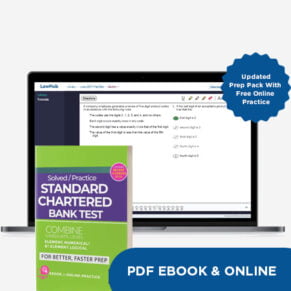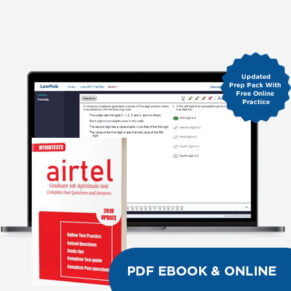- Your bag is empty
- Continue shopping
Bookstore
NDDC Scholarship Past Questions And Answers – Renewable Energy
Original price was: $50.$39Current price is: $39.
Up-to-date / Real NDDC Scholarship Renewable energy Test Past Questions and Answer will help you prepare faster and smarter for the NDDC Scholarship. Got shortlisted with few days or hours left to prepare? this pack will give you the insight you need to ace the tests and improve your chance of passing the test.
Looking for a Different Course? Check all NDDC Past Questions Here –>
NDDC Scholarship Past Questions And Answers – Renewable Energy
Download the NDDC Scholarship Renewable Energy Test Past Questions Practice Pack from this page in PDF format. The NDDC Scholarship test past questions pack makes your preparation easier and much better. Featuring questions from previous assessments as well as solutions to these questions.
About NDDC Nigeria
The Niger Delta Development Commission is a federal government agency established by Nigerian president Olusegun Obasanjo in the year 2000 with the sole mandate of developing the oil-rich Niger Delta region of Nigeria.
About The NDDC Scholarship
- The Niger Delta Development Commission (NDDC) Scholarship is a program initiated by the Nigerian government to provide educational opportunities for students from the Niger Delta region. The Niger Delta region is known for its significant oil and gas reserves, but it has also faced numerous socio-economic challenges. One of the ways the government aims to address these challenges is by offering scholarships to qualified students from the region to pursue higher education overseas.
- The amount for the foreign scholarship shall be based on the prevailing exchange rate of the Naira.Current Application Closing Date is 3rd November, 2023.
Application Procedure
- 1.The following documents must be attached to the application:
2.Recent passport photograph
3.Local Government Identification Letter
4.Post Graduate admission letter from a recognized overseas university
Relevant degrees from recognized universities
5.NYSC Discharge/Exemption Certificate
6.Upon successful completion of the application form, a registration number will be automatically assigned.
7.Applicants are advised to print a hard copy of the online-generated acknowledgment for future reference.
8.All shortlisted applicants will be announced and posted on the NDDC website: www.NDDC.gov.ng. These shortlisted candidates will subsequently be required to take part in a Computer-Based Test (CBT). Eligibility
To be eligible for the scholarship, a scholar must hail from the Niger Delta Region and have achieved a First Class Degree, Second Class Upper, or Lower Division.
The Selection Process
- 1. Initial Application: Interested candidates must submit an online application via the Commission’s Website.
2. Preliminary Shortlisting: Candidates will be shortlisted based on the following criteria:
WASSCE/NECO results
3. Undergraduate Degree classification (1st Class, Second Class Upper/Lower)
4. Local Government Identification
5. Computer-Based Test: Shortlisted candidates will undergo a computer-based test conducted by our consultants in Rivers State.
6. Minimum Test Score: Candidates must achieve a minimum score of 70% in the test to proceed to the next stage.
7. Further Shortlisting: Candidates who successfully pass the test will be further shortlisted.
8. Final Verification: The final verification of the candidates will be done through the Local Government Area (LGA) and Community Development Committee (CDC).
About the NDDC Scholarship test format
NDDC overseas scholarship test was conducted by Cinfores-Ltd, between 2010 and 2015. Since 2016, the tests are now conducted by MEIL (MARG Educational International Limited).
The test usually comprises of 2 sections –
1. General questions which everyone will have to sit, and
2. Discipline-based questions.
For example, candidates in Engineering and Science related disciplines could take a mix of science-based questions like maths, English, physics and chemistry for part 1, then discipline-specific questions for part 2. The test usually last between 30 to 60 minutes.
Sample Past Questions And Answers for NDDC Scholarship – Renewable Energy
Question 1: Which of the following is considered a renewable energy source?
A Natural Gas
B Coal
C Solar Energy
D Petroleum
Answer: C Solar Energy
Question 2: What is the primary advantage of wind turbines in generating electricity?
A Consistent power output
B Low installation cost
C Minimal environmental impact
D Energy storage capability
Answer: C Minimal environmental impact
Question 3: Which renewable energy source relies on the heating of water to produce steam for electricity generation?
A Geothermal
B Biomass
C Hydroelectric
D Tidal
Answer: A Geothermal
Question 4: What does PV stand for in the context of solar energy?
A Photovoltaic
B Potential Voltage
C Personal Vehicle
D Power Variation
Answer: A Photovoltaic
Question 5: Which renewable energy source harnesses the gravitational force of water to generate electricity?
A Solar Power
B Biomass
C Wind Energy
D Hydroelectric Power
Answer: D Hydroelectric Power
Question 6: What is the process of converting organic materials into biofuels or other forms of energy called?
A Combustion
B Fermentation
C Fission
D Fusion
Answer: B Fermentation
Question 7: Which of the following is NOT a type of biomass feedstock used for energy production?
A Wood
B Corn
C Natural Gas
D Sugarcane
Answer: C Natural Gas
Question 8: Which renewable energy source relies on the movement of tides and waves to generate electricity?
A Solar Power
B Biomass
C Wind Energy
D Tidal Power
Correct Answer: D Tidal Power
Question 9: What is the term for the process of converting sunlight into electricity using semiconducting materials?
A Wind conversion
B Hydroelectric generation
C Photovoltaic conversion
D Tidal transformation
Answer: C Photovoltaic conversion
Question 10: Which renewable energy source involves capturing and using the heat produced by the Earth’s core?
A Solar Power
B Biomass
C Geothermal Energy
D Wind Energy
Answer: C Geothermal Energy
Question 11: What is the primary greenhouse gas associated with the burning of fossil fuels for energy production?
A Carbon dioxide (CO2)
B Methane (CH4)
C Nitrous oxide (N2O)
D Ozone (O3)
Answer: A Carbon dioxide (CO2)
Question 12: Which renewable energy technology uses mirrors or lenses to concentrate sunlight onto a small area for electricity generation?
A Solar panels
B Solar cells
C Solar thermal
D Solar wind
Answer: C Solar thermal
Question 13: What is the term for the process of converting kinetic energy from the wind into mechanical power?
A Wind conversion
B Wind propulsion
C Wind energy harvesting
D Wind power generation
Answer: D Wind power generation
Question 14: Which renewable energy source relies on the natural decay of organic materials to produce biogas?
A Biomass
B Tidal energy
C Geothermal energy
D Solar energy
Answer: A Biomass
Question 15: In the context of renewable energy, what does “net metering” refer to?
A A method for measuring wind speed
B A billing arrangement for solar panel owners
C A type of solar panel technology
D A wind turbine design
Answer: B A billing arrangement for solar panel owners
Question 16 Which renewable energy source is known for its ability to provide a consistent and reliable source of electricity?
A Biomass
B Solar power
C Wind energy
D Geothermal energy
Answer: D Geothermal energy
Question17: What is the primary challenge associated with the integration of renewable energy sources into the electrical grid?
A High installation costs
B Energy storage
C Intermittent power generation
D Environmental impact
Answer: C Intermittent power generation
Question 18: Which renewable energy technology uses the temperature difference between the Earth’s surface and deep underground to generate electricity?
A Solar panels
B Wind turbines
C Geothermal power plants
D Tidal generators
Answer: C Geothermal power plants
Question 19: What is the term for the process of capturing and storing carbon dioxide emissions from industrial processes or power plants?
A Carbon offset
B Carbon sequestration
C Carbon trading
D Carbon neutrality
Answer: B Carbon sequestration
Question 20: Which renewable energy source is generated by the movement of air masses due to temperature differences in the atmosphere?
A Solar power
B Biomass
C Wind energy
D Tidal power
Answer: C Wind energy
| Select Option | Get eBook, Get eBook+Online Practice, Get Online Practice |
|---|









Customer reviews
Reviews
There are no reviews yet.
Write a customer review